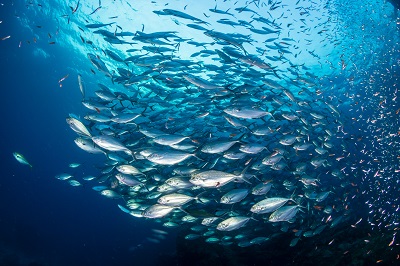Country seeks to optimize the potential of a sustainable wild capture fisheries sector.
Costa Rica’s ambitious blue economic development journey is firmly on course, driven by its recently drafted first-ever oceans economy and trade strategy that seeks to harness two fisheries – big pelagics and coastal fish.
UNCTAD and the United Nations Division for Ocean Affairs and the Law of the Sea (DOALOS) brought together more than 50 government representatives, key fisheries actors and other development partners to discuss and validate the strategy during a workshop held 30 and 31 October in Puntarenas, Costa Rica.
The strategy was formulated under the Oceans Economy and Trade Strategies (OETS) project implemented in Costa Rica by UNCTAD and DOALOS in cooperation with UNDP.
The project aims to support developing countries in realizing economic benefits from the sustainable use of marine resources.
“There is immense potential to use resources more sustainably, scale up value addition and enhance social inclusion in these two fisheries,” UNCTAD’s legal officer David Vivas Eugui said.
“In the past five years, Costa Rica’s trade balance surplus for coastal fish has ranged between US$10 and $25 million, which could be increased,” he added.
Making waves
Relatively well integrated into global value chains, Costa Rica is making waves by leapfrogging into activities with strong sustainability and technology content.
It has gained significant traction through its booming coastal and biodiversity-based tourism sector. It has also earned an international reputation for its unique marine natural assets and developed an ambitious, specificity-driven country brand.
Within the oceans economy’s emerging vibrant sectors, fisheries and aquaculture are becoming a key component of the country’s development policy, with strong links to tourism and employment creation.
They represent an important source of food security, social inclusion and wealth generation in many coastal communities.
The fisheries and aquaculture sectors accounted for 1.53% of the country’s national gross domestic product over the 2010-2015 period, generating more than 8,000 direct jobs.
UNCTAD’s research shows that the potential of big pelagics and coastal fish remains only partially exploited, with multiple opportunities to further develop value chains.
Huge potential in sustainable fishing
“Facilitating sustainable fishing will allow the sector to compete in international markets and develop coastal regions. This is one of the country’s highest public priorities,” said Víctor Umaña, general coordinator in the country’s Ministry of Foreign Trade (COMEX).
Under the OETS project, Costa Rica is seeking to identify new ways to capitalize on the booming international demand for fisheries’ products, such as those of tuna, mahi mahi, sword fish, croakers and red snappers.
It’s also seeking to increase domestic productive capacity, while building more resilient links with export markets in a climate-friendly manner.
“We believe access to international markets brings greater benefits when carried out sustainably,” said Daniel Carrasco, president of the Costa Rican Institute for Fisheries and Aquaculture (INCOPESCA).
Research by UNCTAD and DOALOS found that big pelagics and coastal fish accounted for roughly 30% of domestic landings between 2011 and 2015.
By comparison, species such as swordfish and croaker sold at high market prices, resulting in higher profits for actors involved in the value chain.
Integrated governance mechanisms
“Integrated governance mechanisms need to be developed to build value in the chains as close to the resource base users as possible,” said Francois Bailet, senior legal officer at DOALOS.
The strategy discussed at the recent workshop is based on findings of previous OETS research. It seeks to address bottlenecks to value addition by proposing policy actions for the next phase of the project.
It proposes actions under six pillars – economic, environmental, social, governance, technology and creation of capacities.
Participants at the workshop agreed on actions such as undertaking market studies on a set of selected products, developing multi-species traceability systems (regulatory and commercial), establishing nationally appropriate climate mitigation and adaptation action plans and strengthening legal and institutional frameworks that underpin blue economies.
They identified elements crucial to sustainable and inclusive development in the two selected fisheries – big pelagics and coastal fish – and refined the strategy.
Following the workshop, further stakeholder input will be gathered and incorporated into the strategy, expected to be adopted by political actors by the end of the year.

